Examining Auditor's Public Interest Role and Audit Quality
VerifiedAdded on 2023/04/23
|18
|4522
|437
Report
AI Summary
This report examines the critical role of auditors in upholding public interest and ensuring audit quality, particularly in light of potential material misstatements in financial statements. It assesses the impact of such misstatements on key stakeholders of Orica Limited, highlighting risks to employees, suppliers, shareholders, and the government. The report delves into auditor independence, whistleblowing, and APES 110 requirements, emphasizing the importance of ethical conduct. Furthermore, it draws lessons from the Enron scandal and Arthur Andersen's behavior, advocating for correct audit standards, auditor incentives, independent oversight, and strong internal controls. The report concludes by outlining measures auditors must take to prevent future collapses, emphasizing the need for objectivity, professional competence, and adherence to public interest requirements. Desklib provides access to similar solved assignments and past papers for students.
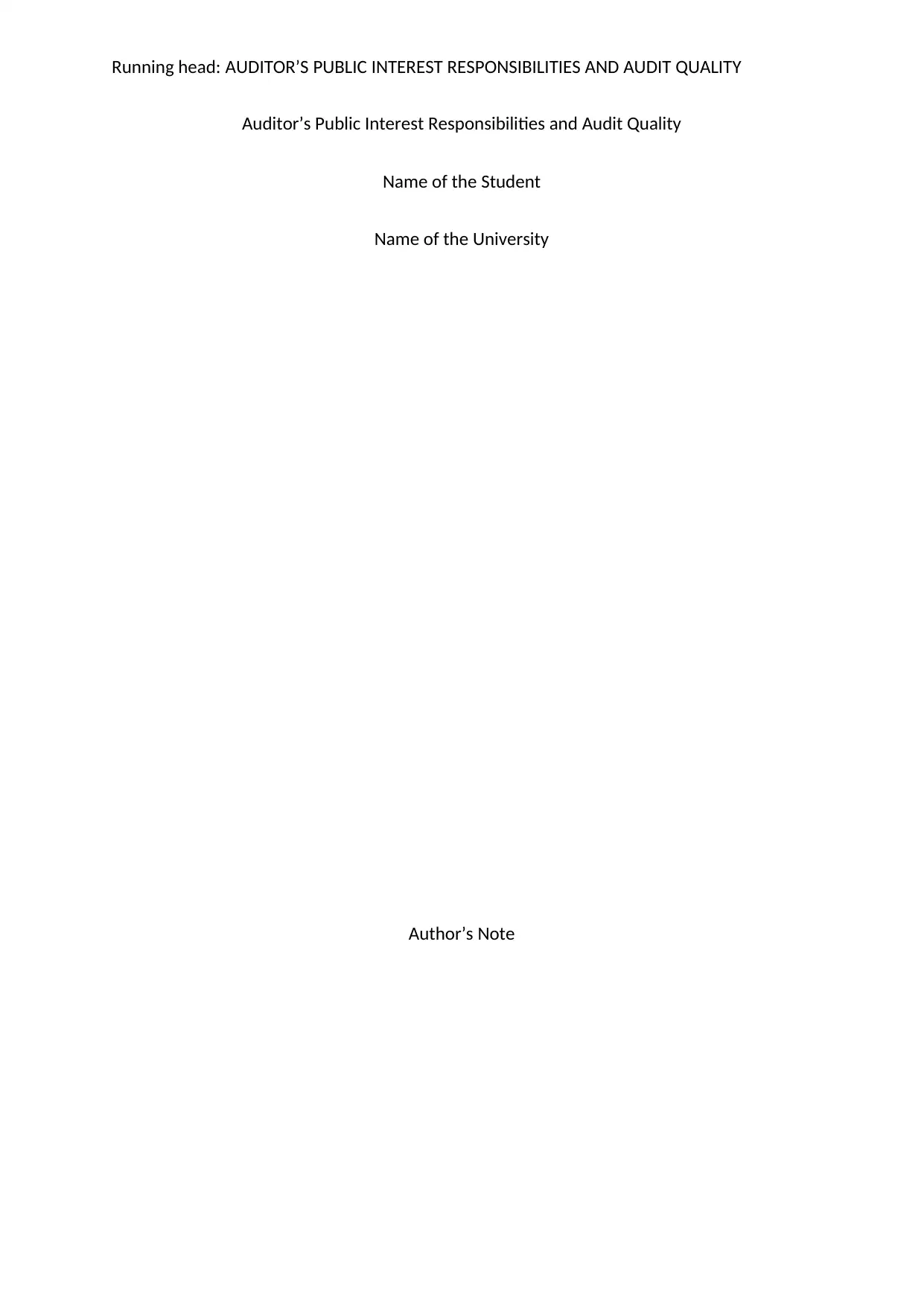
Running head: AUDITOR’S PUBLIC INTEREST RESPONSIBILITIES AND AUDIT QUALITY
Auditor’s Public Interest Responsibilities and Audit Quality
Name of the Student
Name of the University
Author’s Note
Auditor’s Public Interest Responsibilities and Audit Quality
Name of the Student
Name of the University
Author’s Note
Paraphrase This Document
Need a fresh take? Get an instant paraphrase of this document with our AI Paraphraser
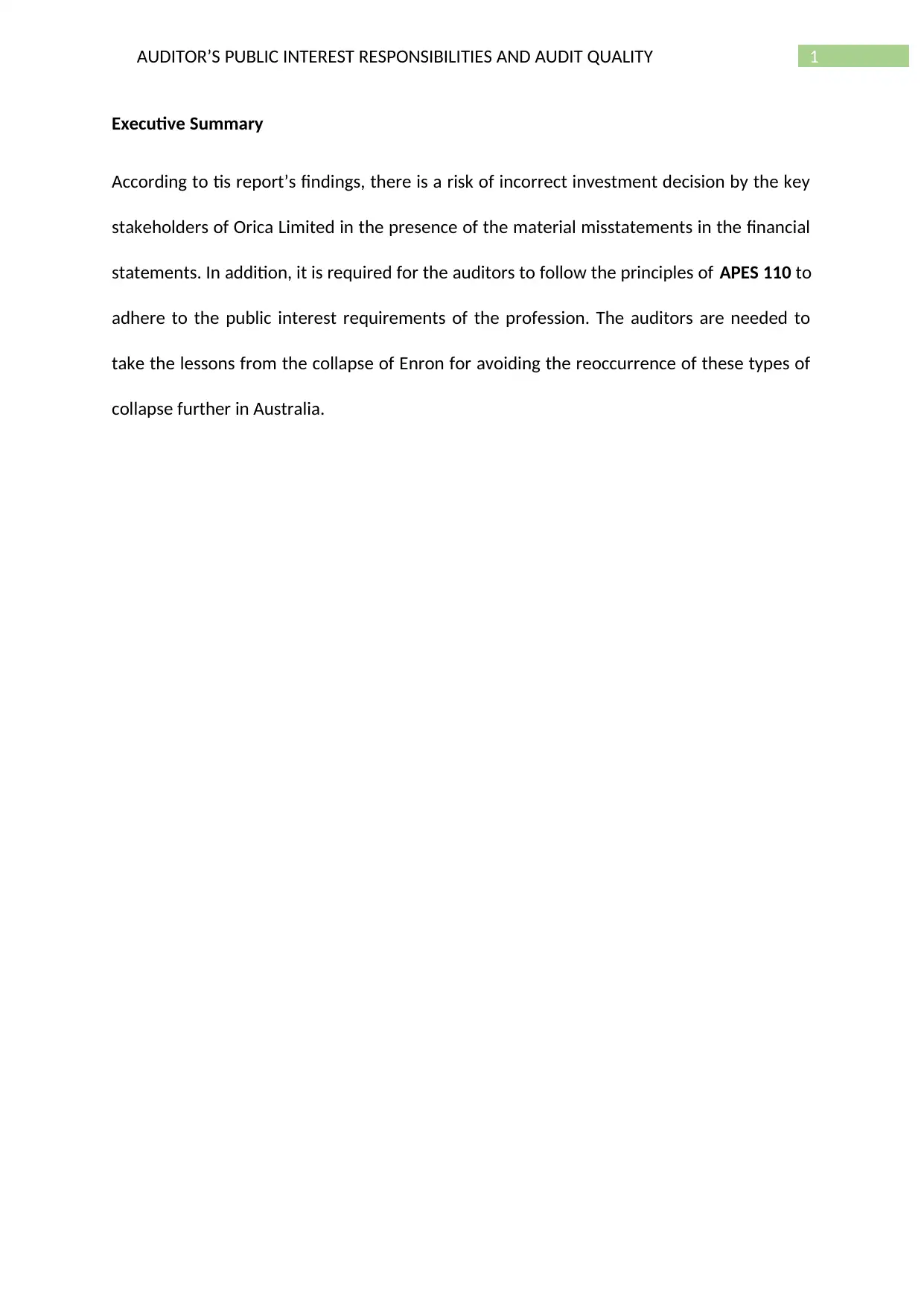
1AUDITOR’S PUBLIC INTEREST RESPONSIBILITIES AND AUDIT QUALITY
Executive Summary
According to tis report’s findings, there is a risk of incorrect investment decision by the key
stakeholders of Orica Limited in the presence of the material misstatements in the financial
statements. In addition, it is required for the auditors to follow the principles of APES 110 to
adhere to the public interest requirements of the profession. The auditors are needed to
take the lessons from the collapse of Enron for avoiding the reoccurrence of these types of
collapse further in Australia.
Executive Summary
According to tis report’s findings, there is a risk of incorrect investment decision by the key
stakeholders of Orica Limited in the presence of the material misstatements in the financial
statements. In addition, it is required for the auditors to follow the principles of APES 110 to
adhere to the public interest requirements of the profession. The auditors are needed to
take the lessons from the collapse of Enron for avoiding the reoccurrence of these types of
collapse further in Australia.
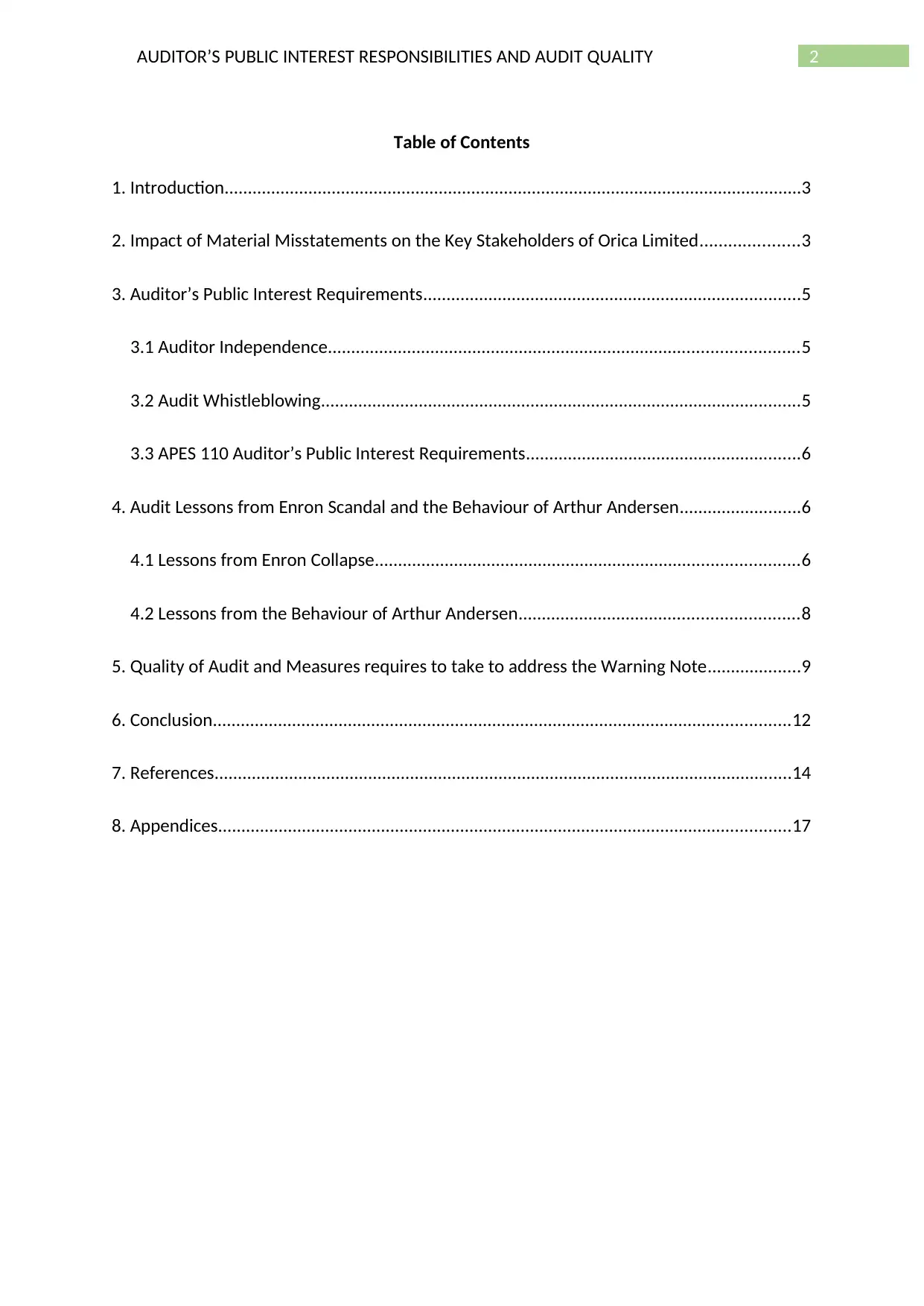
2AUDITOR’S PUBLIC INTEREST RESPONSIBILITIES AND AUDIT QUALITY
Table of Contents
1. Introduction............................................................................................................................3
2. Impact of Material Misstatements on the Key Stakeholders of Orica Limited.....................3
3. Auditor’s Public Interest Requirements.................................................................................5
3.1 Auditor Independence.....................................................................................................5
3.2 Audit Whistleblowing.......................................................................................................5
3.3 APES 110 Auditor’s Public Interest Requirements...........................................................6
4. Audit Lessons from Enron Scandal and the Behaviour of Arthur Andersen..........................6
4.1 Lessons from Enron Collapse...........................................................................................6
4.2 Lessons from the Behaviour of Arthur Andersen............................................................8
5. Quality of Audit and Measures requires to take to address the Warning Note....................9
6. Conclusion............................................................................................................................12
7. References............................................................................................................................14
8. Appendices...........................................................................................................................17
Table of Contents
1. Introduction............................................................................................................................3
2. Impact of Material Misstatements on the Key Stakeholders of Orica Limited.....................3
3. Auditor’s Public Interest Requirements.................................................................................5
3.1 Auditor Independence.....................................................................................................5
3.2 Audit Whistleblowing.......................................................................................................5
3.3 APES 110 Auditor’s Public Interest Requirements...........................................................6
4. Audit Lessons from Enron Scandal and the Behaviour of Arthur Andersen..........................6
4.1 Lessons from Enron Collapse...........................................................................................6
4.2 Lessons from the Behaviour of Arthur Andersen............................................................8
5. Quality of Audit and Measures requires to take to address the Warning Note....................9
6. Conclusion............................................................................................................................12
7. References............................................................................................................................14
8. Appendices...........................................................................................................................17
⊘ This is a preview!⊘
Do you want full access?
Subscribe today to unlock all pages.

Trusted by 1+ million students worldwide
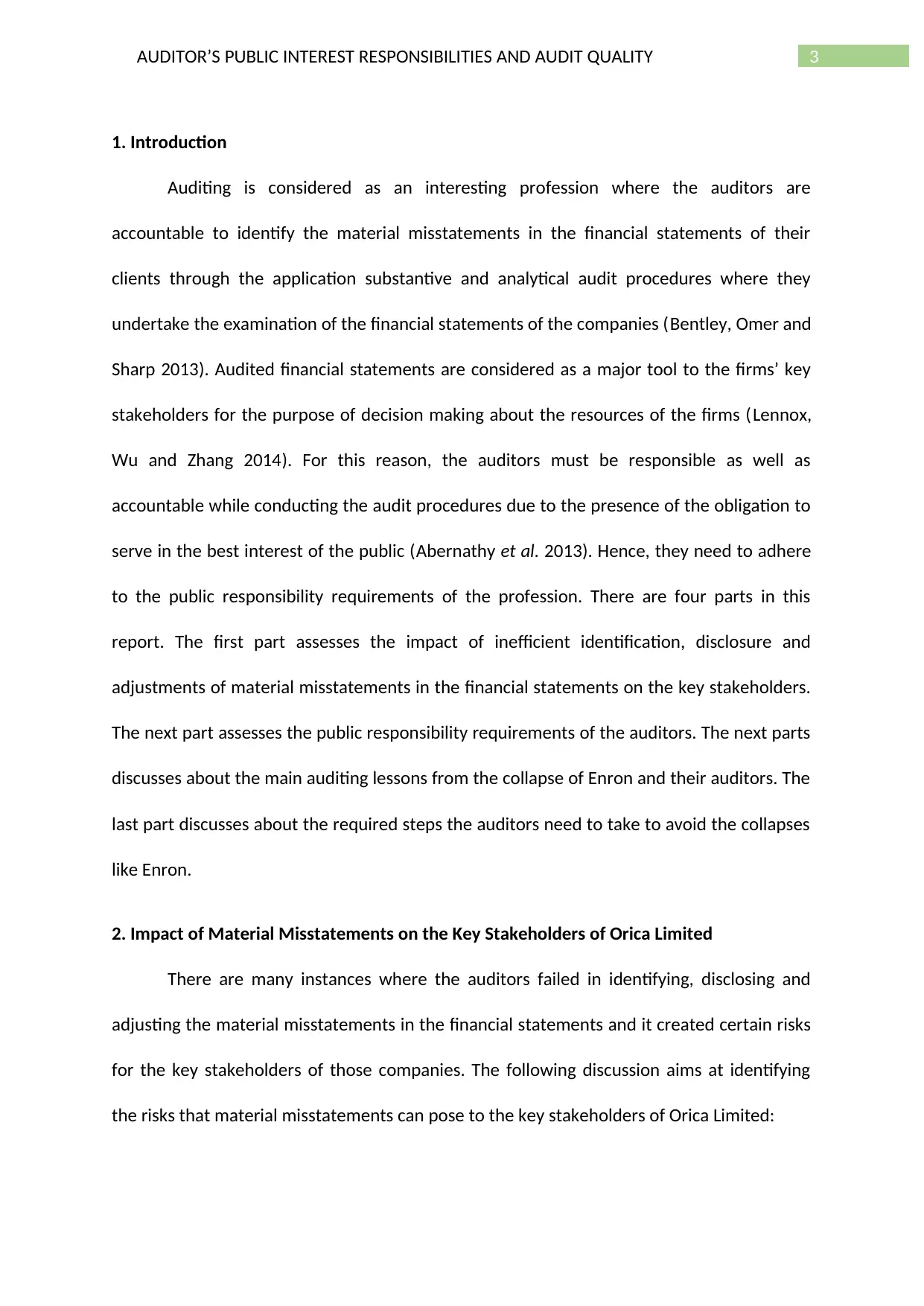
3AUDITOR’S PUBLIC INTEREST RESPONSIBILITIES AND AUDIT QUALITY
1. Introduction
Auditing is considered as an interesting profession where the auditors are
accountable to identify the material misstatements in the financial statements of their
clients through the application substantive and analytical audit procedures where they
undertake the examination of the financial statements of the companies (Bentley, Omer and
Sharp 2013). Audited financial statements are considered as a major tool to the firms’ key
stakeholders for the purpose of decision making about the resources of the firms (Lennox,
Wu and Zhang 2014). For this reason, the auditors must be responsible as well as
accountable while conducting the audit procedures due to the presence of the obligation to
serve in the best interest of the public (Abernathy et al. 2013). Hence, they need to adhere
to the public responsibility requirements of the profession. There are four parts in this
report. The first part assesses the impact of inefficient identification, disclosure and
adjustments of material misstatements in the financial statements on the key stakeholders.
The next part assesses the public responsibility requirements of the auditors. The next parts
discusses about the main auditing lessons from the collapse of Enron and their auditors. The
last part discusses about the required steps the auditors need to take to avoid the collapses
like Enron.
2. Impact of Material Misstatements on the Key Stakeholders of Orica Limited
There are many instances where the auditors failed in identifying, disclosing and
adjusting the material misstatements in the financial statements and it created certain risks
for the key stakeholders of those companies. The following discussion aims at identifying
the risks that material misstatements can pose to the key stakeholders of Orica Limited:
1. Introduction
Auditing is considered as an interesting profession where the auditors are
accountable to identify the material misstatements in the financial statements of their
clients through the application substantive and analytical audit procedures where they
undertake the examination of the financial statements of the companies (Bentley, Omer and
Sharp 2013). Audited financial statements are considered as a major tool to the firms’ key
stakeholders for the purpose of decision making about the resources of the firms (Lennox,
Wu and Zhang 2014). For this reason, the auditors must be responsible as well as
accountable while conducting the audit procedures due to the presence of the obligation to
serve in the best interest of the public (Abernathy et al. 2013). Hence, they need to adhere
to the public responsibility requirements of the profession. There are four parts in this
report. The first part assesses the impact of inefficient identification, disclosure and
adjustments of material misstatements in the financial statements on the key stakeholders.
The next part assesses the public responsibility requirements of the auditors. The next parts
discusses about the main auditing lessons from the collapse of Enron and their auditors. The
last part discusses about the required steps the auditors need to take to avoid the collapses
like Enron.
2. Impact of Material Misstatements on the Key Stakeholders of Orica Limited
There are many instances where the auditors failed in identifying, disclosing and
adjusting the material misstatements in the financial statements and it created certain risks
for the key stakeholders of those companies. The following discussion aims at identifying
the risks that material misstatements can pose to the key stakeholders of Orica Limited:
Paraphrase This Document
Need a fresh take? Get an instant paraphrase of this document with our AI Paraphraser
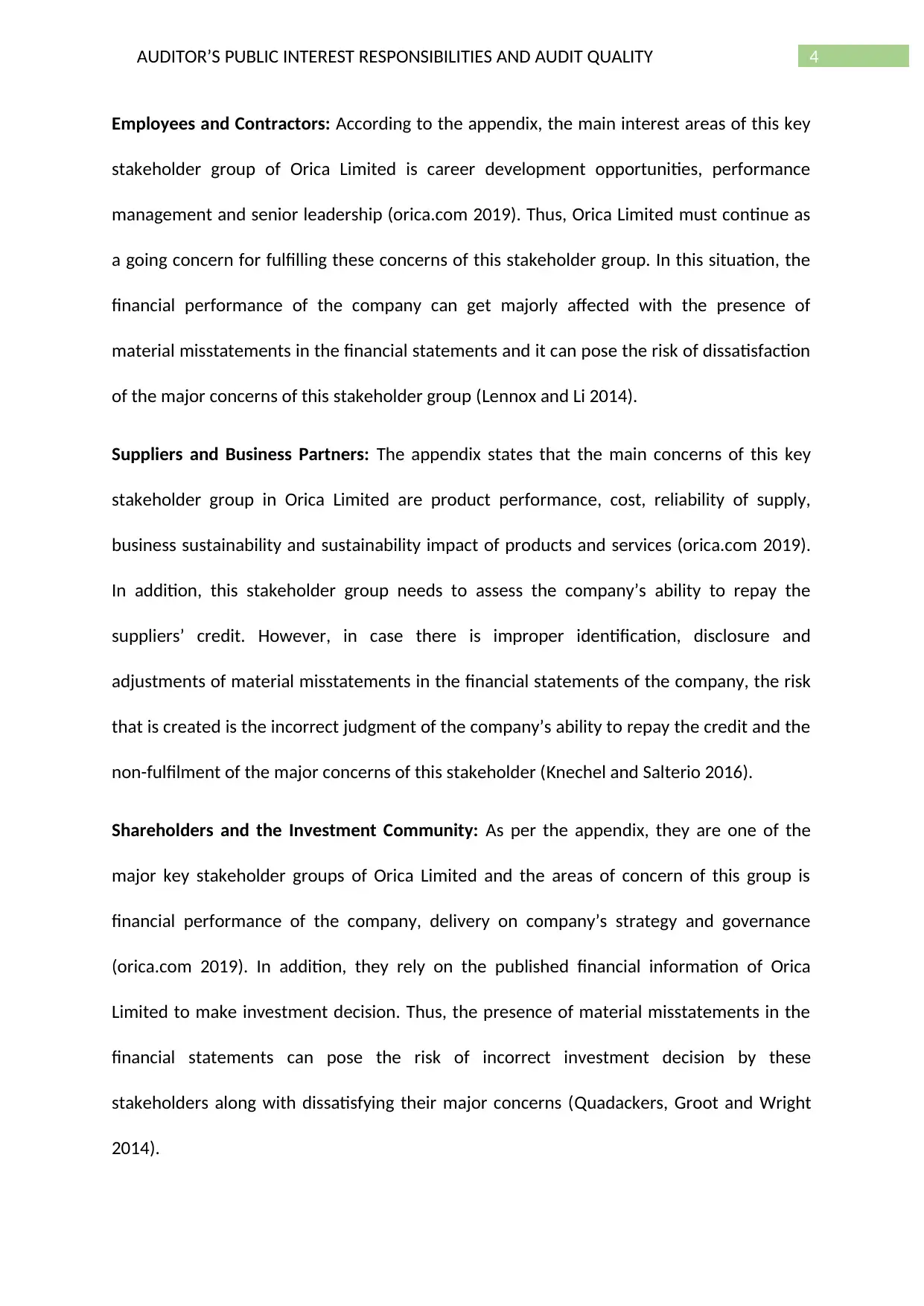
4AUDITOR’S PUBLIC INTEREST RESPONSIBILITIES AND AUDIT QUALITY
Employees and Contractors: According to the appendix, the main interest areas of this key
stakeholder group of Orica Limited is career development opportunities, performance
management and senior leadership (orica.com 2019). Thus, Orica Limited must continue as
a going concern for fulfilling these concerns of this stakeholder group. In this situation, the
financial performance of the company can get majorly affected with the presence of
material misstatements in the financial statements and it can pose the risk of dissatisfaction
of the major concerns of this stakeholder group (Lennox and Li 2014).
Suppliers and Business Partners: The appendix states that the main concerns of this key
stakeholder group in Orica Limited are product performance, cost, reliability of supply,
business sustainability and sustainability impact of products and services (orica.com 2019).
In addition, this stakeholder group needs to assess the company’s ability to repay the
suppliers’ credit. However, in case there is improper identification, disclosure and
adjustments of material misstatements in the financial statements of the company, the risk
that is created is the incorrect judgment of the company’s ability to repay the credit and the
non-fulfilment of the major concerns of this stakeholder (Knechel and Salterio 2016).
Shareholders and the Investment Community: As per the appendix, they are one of the
major key stakeholder groups of Orica Limited and the areas of concern of this group is
financial performance of the company, delivery on company’s strategy and governance
(orica.com 2019). In addition, they rely on the published financial information of Orica
Limited to make investment decision. Thus, the presence of material misstatements in the
financial statements can pose the risk of incorrect investment decision by these
stakeholders along with dissatisfying their major concerns (Quadackers, Groot and Wright
2014).
Employees and Contractors: According to the appendix, the main interest areas of this key
stakeholder group of Orica Limited is career development opportunities, performance
management and senior leadership (orica.com 2019). Thus, Orica Limited must continue as
a going concern for fulfilling these concerns of this stakeholder group. In this situation, the
financial performance of the company can get majorly affected with the presence of
material misstatements in the financial statements and it can pose the risk of dissatisfaction
of the major concerns of this stakeholder group (Lennox and Li 2014).
Suppliers and Business Partners: The appendix states that the main concerns of this key
stakeholder group in Orica Limited are product performance, cost, reliability of supply,
business sustainability and sustainability impact of products and services (orica.com 2019).
In addition, this stakeholder group needs to assess the company’s ability to repay the
suppliers’ credit. However, in case there is improper identification, disclosure and
adjustments of material misstatements in the financial statements of the company, the risk
that is created is the incorrect judgment of the company’s ability to repay the credit and the
non-fulfilment of the major concerns of this stakeholder (Knechel and Salterio 2016).
Shareholders and the Investment Community: As per the appendix, they are one of the
major key stakeholder groups of Orica Limited and the areas of concern of this group is
financial performance of the company, delivery on company’s strategy and governance
(orica.com 2019). In addition, they rely on the published financial information of Orica
Limited to make investment decision. Thus, the presence of material misstatements in the
financial statements can pose the risk of incorrect investment decision by these
stakeholders along with dissatisfying their major concerns (Quadackers, Groot and Wright
2014).
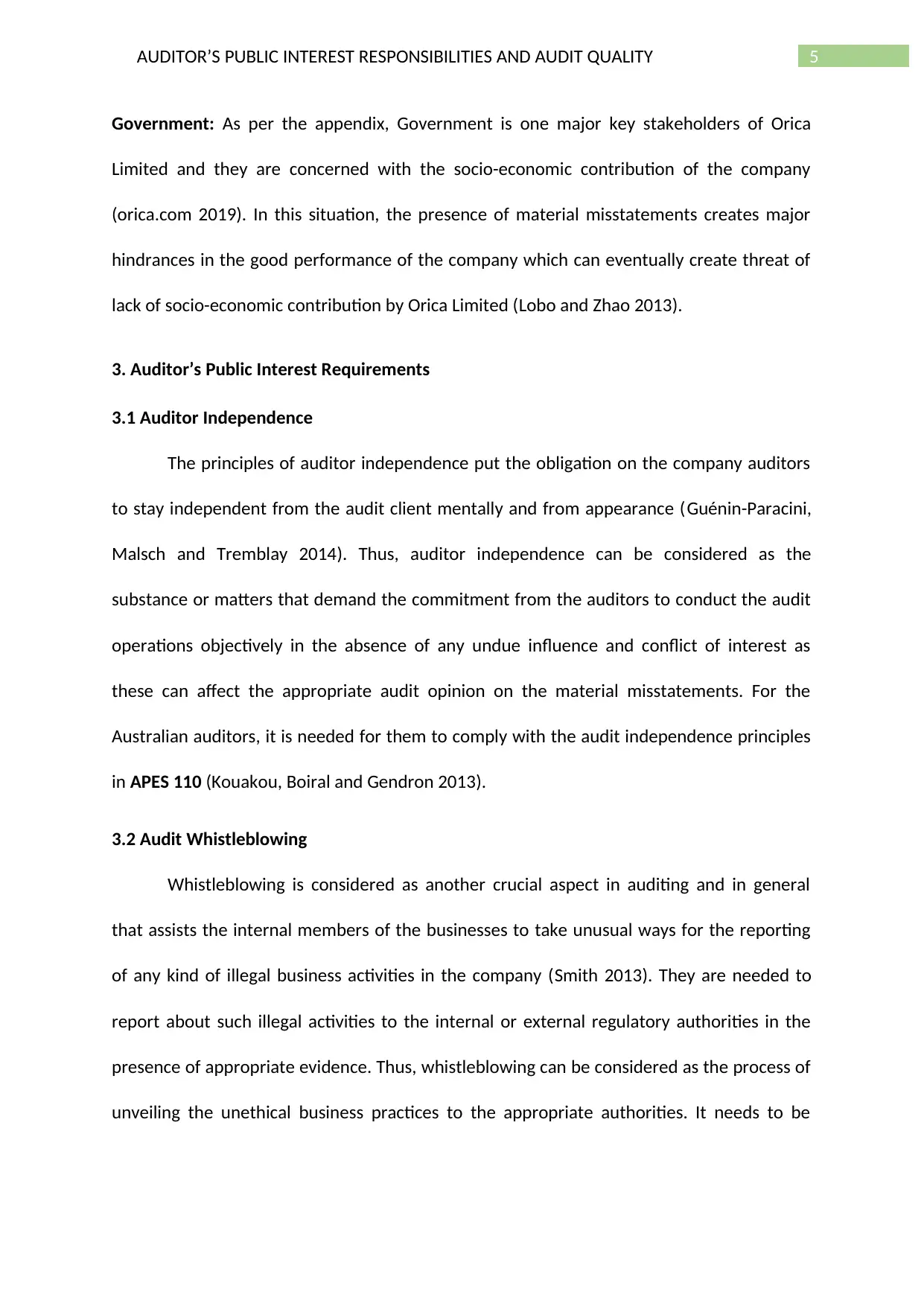
5AUDITOR’S PUBLIC INTEREST RESPONSIBILITIES AND AUDIT QUALITY
Government: As per the appendix, Government is one major key stakeholders of Orica
Limited and they are concerned with the socio-economic contribution of the company
(orica.com 2019). In this situation, the presence of material misstatements creates major
hindrances in the good performance of the company which can eventually create threat of
lack of socio-economic contribution by Orica Limited (Lobo and Zhao 2013).
3. Auditor’s Public Interest Requirements
3.1 Auditor Independence
The principles of auditor independence put the obligation on the company auditors
to stay independent from the audit client mentally and from appearance (Guénin-Paracini,
Malsch and Tremblay 2014). Thus, auditor independence can be considered as the
substance or matters that demand the commitment from the auditors to conduct the audit
operations objectively in the absence of any undue influence and conflict of interest as
these can affect the appropriate audit opinion on the material misstatements. For the
Australian auditors, it is needed for them to comply with the audit independence principles
in APES 110 (Kouakou, Boiral and Gendron 2013).
3.2 Audit Whistleblowing
Whistleblowing is considered as another crucial aspect in auditing and in general
that assists the internal members of the businesses to take unusual ways for the reporting
of any kind of illegal business activities in the company (Smith 2013). They are needed to
report about such illegal activities to the internal or external regulatory authorities in the
presence of appropriate evidence. Thus, whistleblowing can be considered as the process of
unveiling the unethical business practices to the appropriate authorities. It needs to be
Government: As per the appendix, Government is one major key stakeholders of Orica
Limited and they are concerned with the socio-economic contribution of the company
(orica.com 2019). In this situation, the presence of material misstatements creates major
hindrances in the good performance of the company which can eventually create threat of
lack of socio-economic contribution by Orica Limited (Lobo and Zhao 2013).
3. Auditor’s Public Interest Requirements
3.1 Auditor Independence
The principles of auditor independence put the obligation on the company auditors
to stay independent from the audit client mentally and from appearance (Guénin-Paracini,
Malsch and Tremblay 2014). Thus, auditor independence can be considered as the
substance or matters that demand the commitment from the auditors to conduct the audit
operations objectively in the absence of any undue influence and conflict of interest as
these can affect the appropriate audit opinion on the material misstatements. For the
Australian auditors, it is needed for them to comply with the audit independence principles
in APES 110 (Kouakou, Boiral and Gendron 2013).
3.2 Audit Whistleblowing
Whistleblowing is considered as another crucial aspect in auditing and in general
that assists the internal members of the businesses to take unusual ways for the reporting
of any kind of illegal business activities in the company (Smith 2013). They are needed to
report about such illegal activities to the internal or external regulatory authorities in the
presence of appropriate evidence. Thus, whistleblowing can be considered as the process of
unveiling the unethical business practices to the appropriate authorities. It needs to be
⊘ This is a preview!⊘
Do you want full access?
Subscribe today to unlock all pages.

Trusted by 1+ million students worldwide
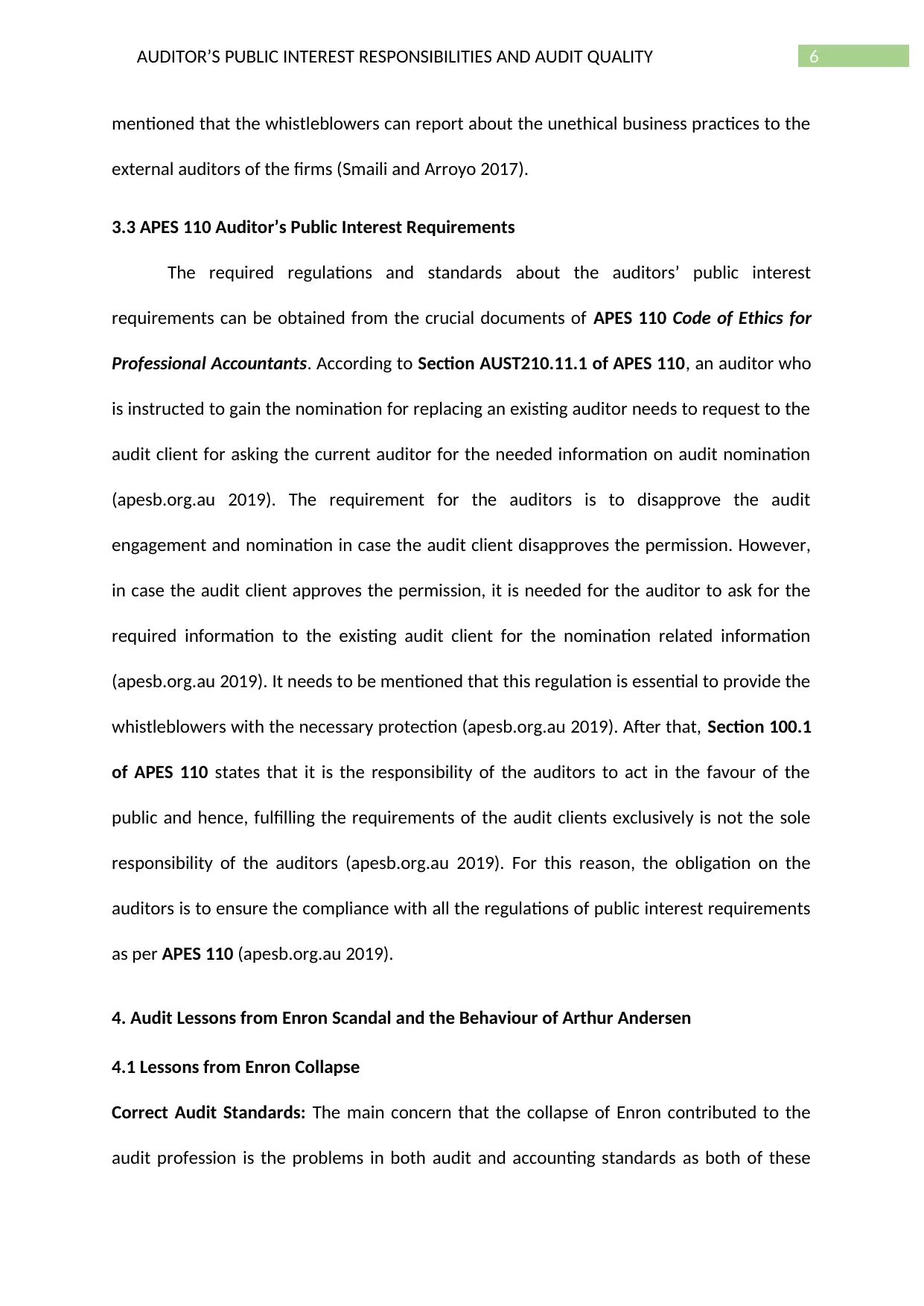
6AUDITOR’S PUBLIC INTEREST RESPONSIBILITIES AND AUDIT QUALITY
mentioned that the whistleblowers can report about the unethical business practices to the
external auditors of the firms (Smaili and Arroyo 2017).
3.3 APES 110 Auditor’s Public Interest Requirements
The required regulations and standards about the auditors’ public interest
requirements can be obtained from the crucial documents of APES 110 Code of Ethics for
Professional Accountants. According to Section AUST210.11.1 of APES 110, an auditor who
is instructed to gain the nomination for replacing an existing auditor needs to request to the
audit client for asking the current auditor for the needed information on audit nomination
(apesb.org.au 2019). The requirement for the auditors is to disapprove the audit
engagement and nomination in case the audit client disapproves the permission. However,
in case the audit client approves the permission, it is needed for the auditor to ask for the
required information to the existing audit client for the nomination related information
(apesb.org.au 2019). It needs to be mentioned that this regulation is essential to provide the
whistleblowers with the necessary protection (apesb.org.au 2019). After that, Section 100.1
of APES 110 states that it is the responsibility of the auditors to act in the favour of the
public and hence, fulfilling the requirements of the audit clients exclusively is not the sole
responsibility of the auditors (apesb.org.au 2019). For this reason, the obligation on the
auditors is to ensure the compliance with all the regulations of public interest requirements
as per APES 110 (apesb.org.au 2019).
4. Audit Lessons from Enron Scandal and the Behaviour of Arthur Andersen
4.1 Lessons from Enron Collapse
Correct Audit Standards: The main concern that the collapse of Enron contributed to the
audit profession is the problems in both audit and accounting standards as both of these
mentioned that the whistleblowers can report about the unethical business practices to the
external auditors of the firms (Smaili and Arroyo 2017).
3.3 APES 110 Auditor’s Public Interest Requirements
The required regulations and standards about the auditors’ public interest
requirements can be obtained from the crucial documents of APES 110 Code of Ethics for
Professional Accountants. According to Section AUST210.11.1 of APES 110, an auditor who
is instructed to gain the nomination for replacing an existing auditor needs to request to the
audit client for asking the current auditor for the needed information on audit nomination
(apesb.org.au 2019). The requirement for the auditors is to disapprove the audit
engagement and nomination in case the audit client disapproves the permission. However,
in case the audit client approves the permission, it is needed for the auditor to ask for the
required information to the existing audit client for the nomination related information
(apesb.org.au 2019). It needs to be mentioned that this regulation is essential to provide the
whistleblowers with the necessary protection (apesb.org.au 2019). After that, Section 100.1
of APES 110 states that it is the responsibility of the auditors to act in the favour of the
public and hence, fulfilling the requirements of the audit clients exclusively is not the sole
responsibility of the auditors (apesb.org.au 2019). For this reason, the obligation on the
auditors is to ensure the compliance with all the regulations of public interest requirements
as per APES 110 (apesb.org.au 2019).
4. Audit Lessons from Enron Scandal and the Behaviour of Arthur Andersen
4.1 Lessons from Enron Collapse
Correct Audit Standards: The main concern that the collapse of Enron contributed to the
audit profession is the problems in both audit and accounting standards as both of these
Paraphrase This Document
Need a fresh take? Get an instant paraphrase of this document with our AI Paraphraser
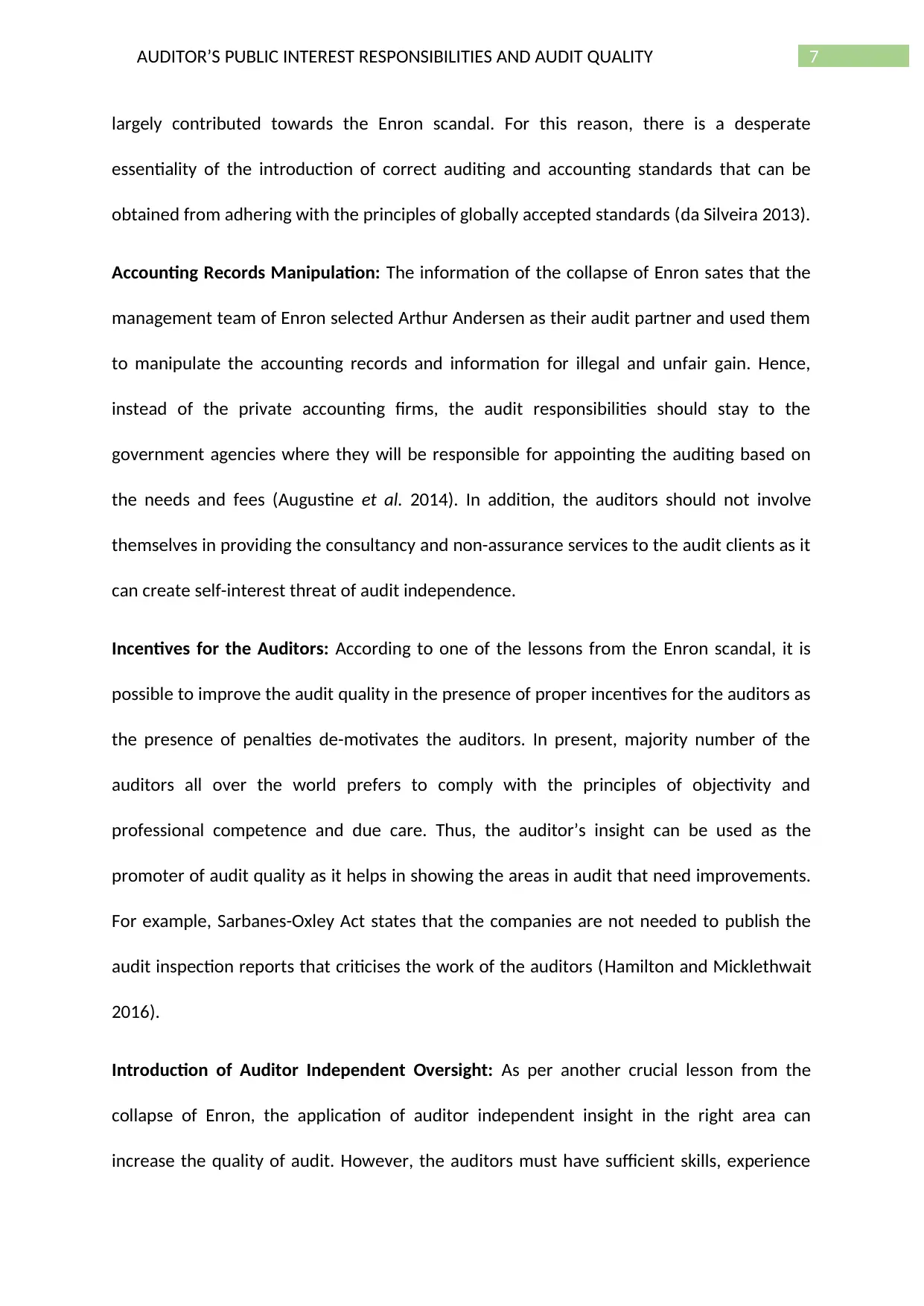
7AUDITOR’S PUBLIC INTEREST RESPONSIBILITIES AND AUDIT QUALITY
largely contributed towards the Enron scandal. For this reason, there is a desperate
essentiality of the introduction of correct auditing and accounting standards that can be
obtained from adhering with the principles of globally accepted standards (da Silveira 2013).
Accounting Records Manipulation: The information of the collapse of Enron sates that the
management team of Enron selected Arthur Andersen as their audit partner and used them
to manipulate the accounting records and information for illegal and unfair gain. Hence,
instead of the private accounting firms, the audit responsibilities should stay to the
government agencies where they will be responsible for appointing the auditing based on
the needs and fees (Augustine et al. 2014). In addition, the auditors should not involve
themselves in providing the consultancy and non-assurance services to the audit clients as it
can create self-interest threat of audit independence.
Incentives for the Auditors: According to one of the lessons from the Enron scandal, it is
possible to improve the audit quality in the presence of proper incentives for the auditors as
the presence of penalties de-motivates the auditors. In present, majority number of the
auditors all over the world prefers to comply with the principles of objectivity and
professional competence and due care. Thus, the auditor’s insight can be used as the
promoter of audit quality as it helps in showing the areas in audit that need improvements.
For example, Sarbanes-Oxley Act states that the companies are not needed to publish the
audit inspection reports that criticises the work of the auditors (Hamilton and Micklethwait
2016).
Introduction of Auditor Independent Oversight: As per another crucial lesson from the
collapse of Enron, the application of auditor independent insight in the right area can
increase the quality of audit. However, the auditors must have sufficient skills, experience
largely contributed towards the Enron scandal. For this reason, there is a desperate
essentiality of the introduction of correct auditing and accounting standards that can be
obtained from adhering with the principles of globally accepted standards (da Silveira 2013).
Accounting Records Manipulation: The information of the collapse of Enron sates that the
management team of Enron selected Arthur Andersen as their audit partner and used them
to manipulate the accounting records and information for illegal and unfair gain. Hence,
instead of the private accounting firms, the audit responsibilities should stay to the
government agencies where they will be responsible for appointing the auditing based on
the needs and fees (Augustine et al. 2014). In addition, the auditors should not involve
themselves in providing the consultancy and non-assurance services to the audit clients as it
can create self-interest threat of audit independence.
Incentives for the Auditors: According to one of the lessons from the Enron scandal, it is
possible to improve the audit quality in the presence of proper incentives for the auditors as
the presence of penalties de-motivates the auditors. In present, majority number of the
auditors all over the world prefers to comply with the principles of objectivity and
professional competence and due care. Thus, the auditor’s insight can be used as the
promoter of audit quality as it helps in showing the areas in audit that need improvements.
For example, Sarbanes-Oxley Act states that the companies are not needed to publish the
audit inspection reports that criticises the work of the auditors (Hamilton and Micklethwait
2016).
Introduction of Auditor Independent Oversight: As per another crucial lesson from the
collapse of Enron, the application of auditor independent insight in the right area can
increase the quality of audit. However, the auditors must have sufficient skills, experience
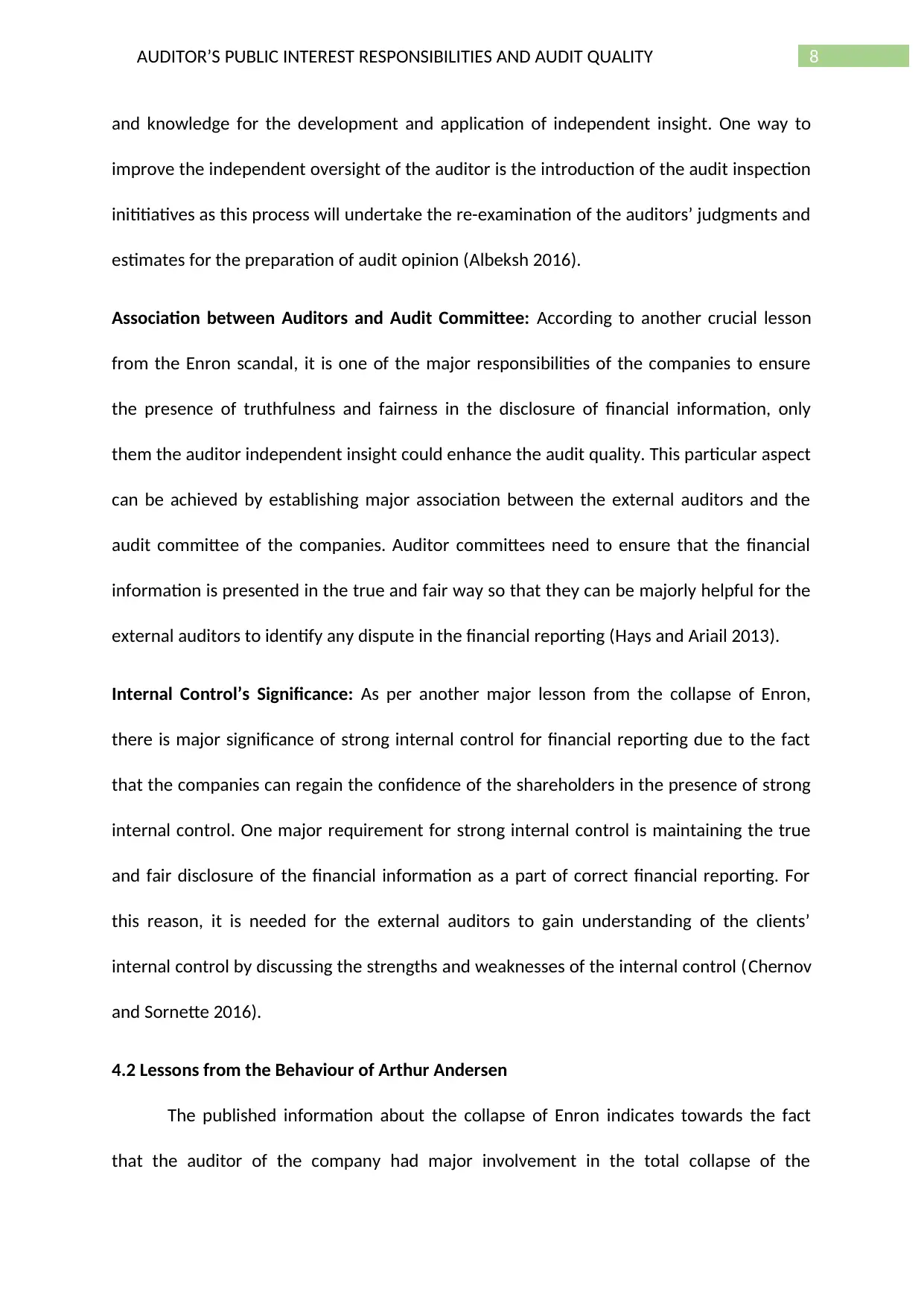
8AUDITOR’S PUBLIC INTEREST RESPONSIBILITIES AND AUDIT QUALITY
and knowledge for the development and application of independent insight. One way to
improve the independent oversight of the auditor is the introduction of the audit inspection
inititiatives as this process will undertake the re-examination of the auditors’ judgments and
estimates for the preparation of audit opinion (Albeksh 2016).
Association between Auditors and Audit Committee: According to another crucial lesson
from the Enron scandal, it is one of the major responsibilities of the companies to ensure
the presence of truthfulness and fairness in the disclosure of financial information, only
them the auditor independent insight could enhance the audit quality. This particular aspect
can be achieved by establishing major association between the external auditors and the
audit committee of the companies. Auditor committees need to ensure that the financial
information is presented in the true and fair way so that they can be majorly helpful for the
external auditors to identify any dispute in the financial reporting (Hays and Ariail 2013).
Internal Control’s Significance: As per another major lesson from the collapse of Enron,
there is major significance of strong internal control for financial reporting due to the fact
that the companies can regain the confidence of the shareholders in the presence of strong
internal control. One major requirement for strong internal control is maintaining the true
and fair disclosure of the financial information as a part of correct financial reporting. For
this reason, it is needed for the external auditors to gain understanding of the clients’
internal control by discussing the strengths and weaknesses of the internal control (Chernov
and Sornette 2016).
4.2 Lessons from the Behaviour of Arthur Andersen
The published information about the collapse of Enron indicates towards the fact
that the auditor of the company had major involvement in the total collapse of the
and knowledge for the development and application of independent insight. One way to
improve the independent oversight of the auditor is the introduction of the audit inspection
inititiatives as this process will undertake the re-examination of the auditors’ judgments and
estimates for the preparation of audit opinion (Albeksh 2016).
Association between Auditors and Audit Committee: According to another crucial lesson
from the Enron scandal, it is one of the major responsibilities of the companies to ensure
the presence of truthfulness and fairness in the disclosure of financial information, only
them the auditor independent insight could enhance the audit quality. This particular aspect
can be achieved by establishing major association between the external auditors and the
audit committee of the companies. Auditor committees need to ensure that the financial
information is presented in the true and fair way so that they can be majorly helpful for the
external auditors to identify any dispute in the financial reporting (Hays and Ariail 2013).
Internal Control’s Significance: As per another major lesson from the collapse of Enron,
there is major significance of strong internal control for financial reporting due to the fact
that the companies can regain the confidence of the shareholders in the presence of strong
internal control. One major requirement for strong internal control is maintaining the true
and fair disclosure of the financial information as a part of correct financial reporting. For
this reason, it is needed for the external auditors to gain understanding of the clients’
internal control by discussing the strengths and weaknesses of the internal control (Chernov
and Sornette 2016).
4.2 Lessons from the Behaviour of Arthur Andersen
The published information about the collapse of Enron indicates towards the fact
that the auditor of the company had major involvement in the total collapse of the
⊘ This is a preview!⊘
Do you want full access?
Subscribe today to unlock all pages.

Trusted by 1+ million students worldwide
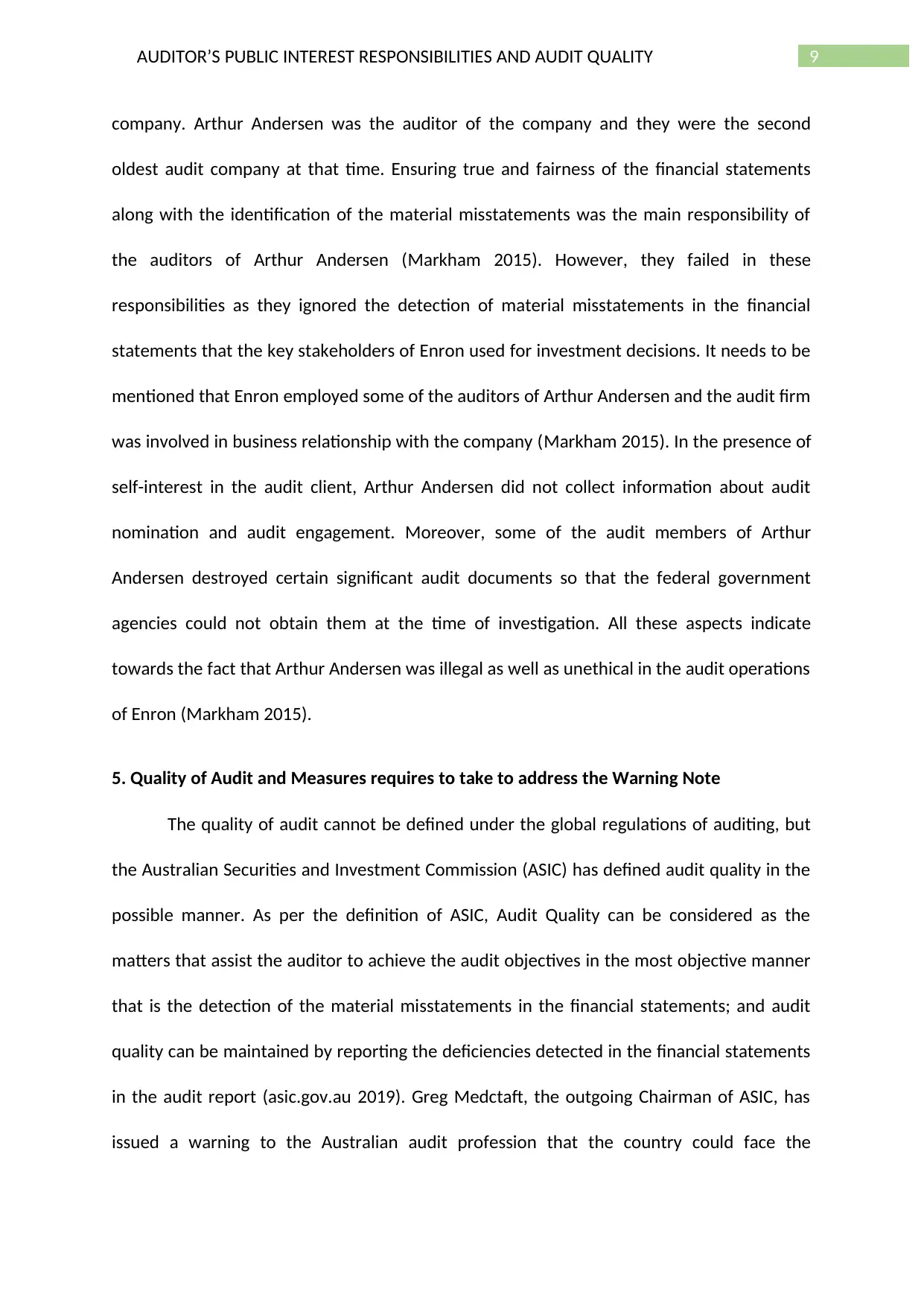
9AUDITOR’S PUBLIC INTEREST RESPONSIBILITIES AND AUDIT QUALITY
company. Arthur Andersen was the auditor of the company and they were the second
oldest audit company at that time. Ensuring true and fairness of the financial statements
along with the identification of the material misstatements was the main responsibility of
the auditors of Arthur Andersen (Markham 2015). However, they failed in these
responsibilities as they ignored the detection of material misstatements in the financial
statements that the key stakeholders of Enron used for investment decisions. It needs to be
mentioned that Enron employed some of the auditors of Arthur Andersen and the audit firm
was involved in business relationship with the company (Markham 2015). In the presence of
self-interest in the audit client, Arthur Andersen did not collect information about audit
nomination and audit engagement. Moreover, some of the audit members of Arthur
Andersen destroyed certain significant audit documents so that the federal government
agencies could not obtain them at the time of investigation. All these aspects indicate
towards the fact that Arthur Andersen was illegal as well as unethical in the audit operations
of Enron (Markham 2015).
5. Quality of Audit and Measures requires to take to address the Warning Note
The quality of audit cannot be defined under the global regulations of auditing, but
the Australian Securities and Investment Commission (ASIC) has defined audit quality in the
possible manner. As per the definition of ASIC, Audit Quality can be considered as the
matters that assist the auditor to achieve the audit objectives in the most objective manner
that is the detection of the material misstatements in the financial statements; and audit
quality can be maintained by reporting the deficiencies detected in the financial statements
in the audit report (asic.gov.au 2019). Greg Medctaft, the outgoing Chairman of ASIC, has
issued a warning to the Australian audit profession that the country could face the
company. Arthur Andersen was the auditor of the company and they were the second
oldest audit company at that time. Ensuring true and fairness of the financial statements
along with the identification of the material misstatements was the main responsibility of
the auditors of Arthur Andersen (Markham 2015). However, they failed in these
responsibilities as they ignored the detection of material misstatements in the financial
statements that the key stakeholders of Enron used for investment decisions. It needs to be
mentioned that Enron employed some of the auditors of Arthur Andersen and the audit firm
was involved in business relationship with the company (Markham 2015). In the presence of
self-interest in the audit client, Arthur Andersen did not collect information about audit
nomination and audit engagement. Moreover, some of the audit members of Arthur
Andersen destroyed certain significant audit documents so that the federal government
agencies could not obtain them at the time of investigation. All these aspects indicate
towards the fact that Arthur Andersen was illegal as well as unethical in the audit operations
of Enron (Markham 2015).
5. Quality of Audit and Measures requires to take to address the Warning Note
The quality of audit cannot be defined under the global regulations of auditing, but
the Australian Securities and Investment Commission (ASIC) has defined audit quality in the
possible manner. As per the definition of ASIC, Audit Quality can be considered as the
matters that assist the auditor to achieve the audit objectives in the most objective manner
that is the detection of the material misstatements in the financial statements; and audit
quality can be maintained by reporting the deficiencies detected in the financial statements
in the audit report (asic.gov.au 2019). Greg Medctaft, the outgoing Chairman of ASIC, has
issued a warning to the Australian audit profession that the country could face the
Paraphrase This Document
Need a fresh take? Get an instant paraphrase of this document with our AI Paraphraser
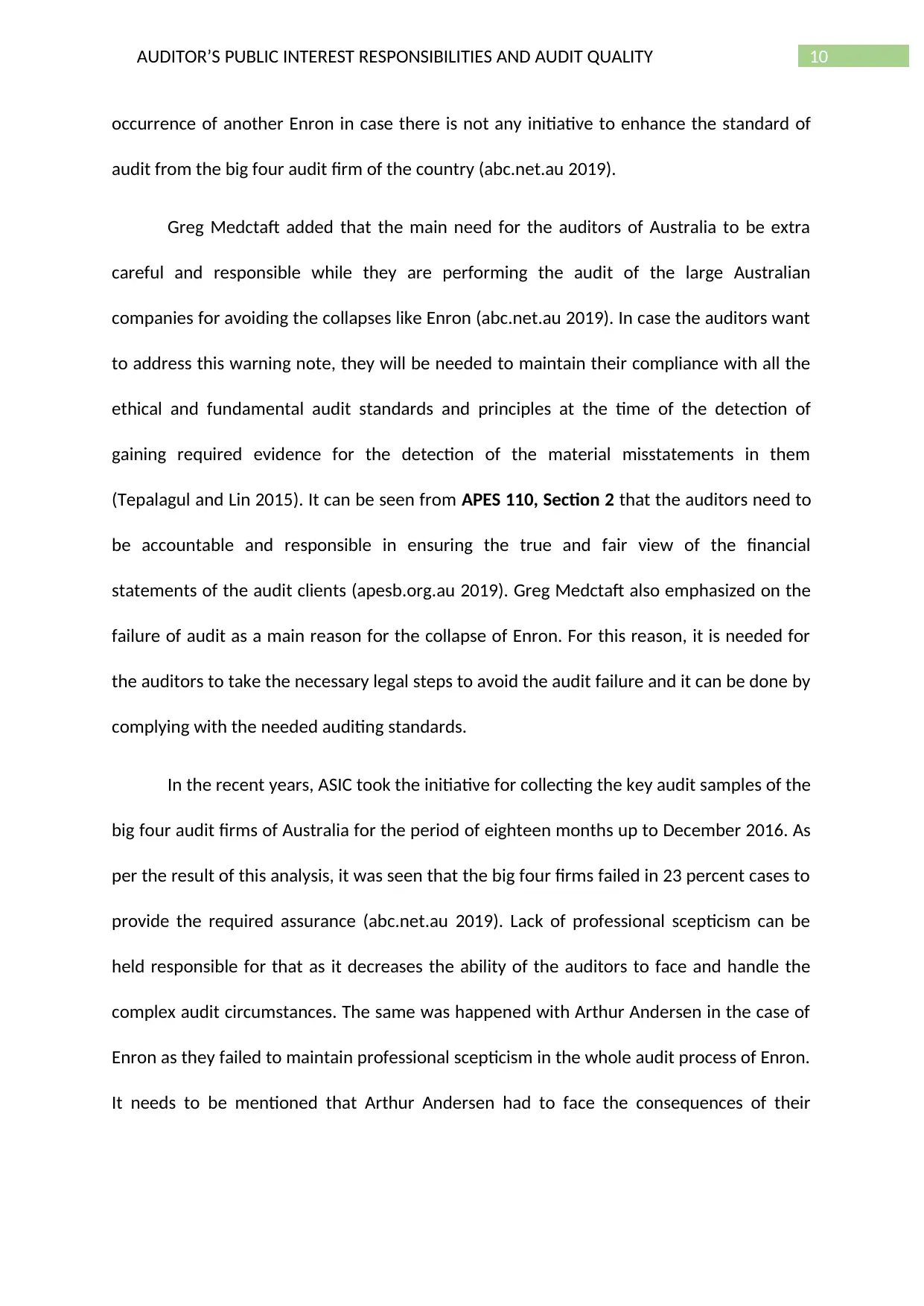
10AUDITOR’S PUBLIC INTEREST RESPONSIBILITIES AND AUDIT QUALITY
occurrence of another Enron in case there is not any initiative to enhance the standard of
audit from the big four audit firm of the country (abc.net.au 2019).
Greg Medctaft added that the main need for the auditors of Australia to be extra
careful and responsible while they are performing the audit of the large Australian
companies for avoiding the collapses like Enron (abc.net.au 2019). In case the auditors want
to address this warning note, they will be needed to maintain their compliance with all the
ethical and fundamental audit standards and principles at the time of the detection of
gaining required evidence for the detection of the material misstatements in them
(Tepalagul and Lin 2015). It can be seen from APES 110, Section 2 that the auditors need to
be accountable and responsible in ensuring the true and fair view of the financial
statements of the audit clients (apesb.org.au 2019). Greg Medctaft also emphasized on the
failure of audit as a main reason for the collapse of Enron. For this reason, it is needed for
the auditors to take the necessary legal steps to avoid the audit failure and it can be done by
complying with the needed auditing standards.
In the recent years, ASIC took the initiative for collecting the key audit samples of the
big four audit firms of Australia for the period of eighteen months up to December 2016. As
per the result of this analysis, it was seen that the big four firms failed in 23 percent cases to
provide the required assurance (abc.net.au 2019). Lack of professional scepticism can be
held responsible for that as it decreases the ability of the auditors to face and handle the
complex audit circumstances. The same was happened with Arthur Andersen in the case of
Enron as they failed to maintain professional scepticism in the whole audit process of Enron.
It needs to be mentioned that Arthur Andersen had to face the consequences of their
occurrence of another Enron in case there is not any initiative to enhance the standard of
audit from the big four audit firm of the country (abc.net.au 2019).
Greg Medctaft added that the main need for the auditors of Australia to be extra
careful and responsible while they are performing the audit of the large Australian
companies for avoiding the collapses like Enron (abc.net.au 2019). In case the auditors want
to address this warning note, they will be needed to maintain their compliance with all the
ethical and fundamental audit standards and principles at the time of the detection of
gaining required evidence for the detection of the material misstatements in them
(Tepalagul and Lin 2015). It can be seen from APES 110, Section 2 that the auditors need to
be accountable and responsible in ensuring the true and fair view of the financial
statements of the audit clients (apesb.org.au 2019). Greg Medctaft also emphasized on the
failure of audit as a main reason for the collapse of Enron. For this reason, it is needed for
the auditors to take the necessary legal steps to avoid the audit failure and it can be done by
complying with the needed auditing standards.
In the recent years, ASIC took the initiative for collecting the key audit samples of the
big four audit firms of Australia for the period of eighteen months up to December 2016. As
per the result of this analysis, it was seen that the big four firms failed in 23 percent cases to
provide the required assurance (abc.net.au 2019). Lack of professional scepticism can be
held responsible for that as it decreases the ability of the auditors to face and handle the
complex audit circumstances. The same was happened with Arthur Andersen in the case of
Enron as they failed to maintain professional scepticism in the whole audit process of Enron.
It needs to be mentioned that Arthur Andersen had to face the consequences of their
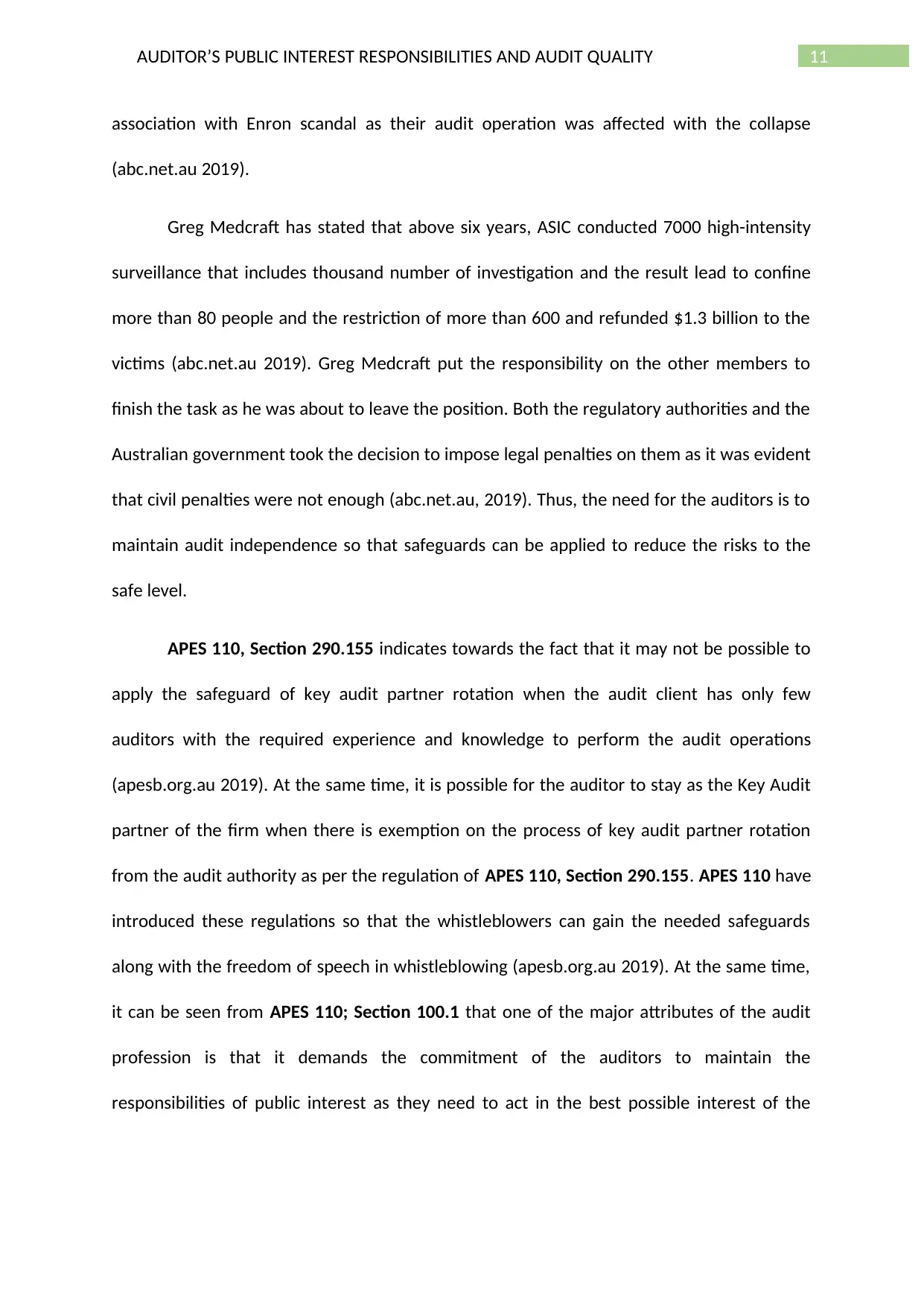
11AUDITOR’S PUBLIC INTEREST RESPONSIBILITIES AND AUDIT QUALITY
association with Enron scandal as their audit operation was affected with the collapse
(abc.net.au 2019).
Greg Medcraft has stated that above six years, ASIC conducted 7000 high-intensity
surveillance that includes thousand number of investigation and the result lead to confine
more than 80 people and the restriction of more than 600 and refunded $1.3 billion to the
victims (abc.net.au 2019). Greg Medcraft put the responsibility on the other members to
finish the task as he was about to leave the position. Both the regulatory authorities and the
Australian government took the decision to impose legal penalties on them as it was evident
that civil penalties were not enough (abc.net.au, 2019). Thus, the need for the auditors is to
maintain audit independence so that safeguards can be applied to reduce the risks to the
safe level.
APES 110, Section 290.155 indicates towards the fact that it may not be possible to
apply the safeguard of key audit partner rotation when the audit client has only few
auditors with the required experience and knowledge to perform the audit operations
(apesb.org.au 2019). At the same time, it is possible for the auditor to stay as the Key Audit
partner of the firm when there is exemption on the process of key audit partner rotation
from the audit authority as per the regulation of APES 110, Section 290.155. APES 110 have
introduced these regulations so that the whistleblowers can gain the needed safeguards
along with the freedom of speech in whistleblowing (apesb.org.au 2019). At the same time,
it can be seen from APES 110; Section 100.1 that one of the major attributes of the audit
profession is that it demands the commitment of the auditors to maintain the
responsibilities of public interest as they need to act in the best possible interest of the
association with Enron scandal as their audit operation was affected with the collapse
(abc.net.au 2019).
Greg Medcraft has stated that above six years, ASIC conducted 7000 high-intensity
surveillance that includes thousand number of investigation and the result lead to confine
more than 80 people and the restriction of more than 600 and refunded $1.3 billion to the
victims (abc.net.au 2019). Greg Medcraft put the responsibility on the other members to
finish the task as he was about to leave the position. Both the regulatory authorities and the
Australian government took the decision to impose legal penalties on them as it was evident
that civil penalties were not enough (abc.net.au, 2019). Thus, the need for the auditors is to
maintain audit independence so that safeguards can be applied to reduce the risks to the
safe level.
APES 110, Section 290.155 indicates towards the fact that it may not be possible to
apply the safeguard of key audit partner rotation when the audit client has only few
auditors with the required experience and knowledge to perform the audit operations
(apesb.org.au 2019). At the same time, it is possible for the auditor to stay as the Key Audit
partner of the firm when there is exemption on the process of key audit partner rotation
from the audit authority as per the regulation of APES 110, Section 290.155. APES 110 have
introduced these regulations so that the whistleblowers can gain the needed safeguards
along with the freedom of speech in whistleblowing (apesb.org.au 2019). At the same time,
it can be seen from APES 110; Section 100.1 that one of the major attributes of the audit
profession is that it demands the commitment of the auditors to maintain the
responsibilities of public interest as they need to act in the best possible interest of the
⊘ This is a preview!⊘
Do you want full access?
Subscribe today to unlock all pages.

Trusted by 1+ million students worldwide
1 out of 18
Related Documents
Your All-in-One AI-Powered Toolkit for Academic Success.
+13062052269
info@desklib.com
Available 24*7 on WhatsApp / Email
![[object Object]](/_next/static/media/star-bottom.7253800d.svg)
Unlock your academic potential
Copyright © 2020–2026 A2Z Services. All Rights Reserved. Developed and managed by ZUCOL.





